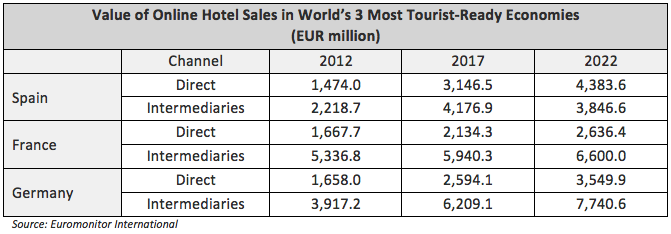
By Mateus Coelho
“In today’s world, either you change or you will be changed. So, either you act and then you make some hard decisions and take some risk … or somebody is going to be acting for you – that’s somebody called Booking.com, Expedia, Airbnb, Google, Amazon, Facebook.”
They’re the words of Sébastien Bazin, CEO of AccorHotels, who spoke at this year’s South America Hotel Investment Conference on the need for hotels to take control – or risk losing their place in the driver’s seat.
According to MicroMetrics, OTAs now have access to more than 99 percent of the world’s hotel inventory. This, alone, isn’t such a startling thought, but then consider that the Priceline Group and Expedia Inc. are predicted to collectively control 94 percent of all online bookings by 2020 and the figures quickly start to become sobering.
In Spain, which this year ranked as the world’s most tourist-ready economy, the numbers interestingly tell a different story.
Since 2012, Euromonitor International reports the value of online hotel booking sales in the country has virtually doubled from €3.69 billion to a forecasted €7.32 billion this year. In spite of the increasing conversation around direct in recent years, third-party sites that include Booking.com, lastminute.com and Atrápalo still contribute more than half of Spain’s online hotel sales at 57 percent. However, this is a drop from 60 percent in 2012 and the percentage is expected to drop to below 50 percent within the next four years.
Compare this with the world’s second and third most-ready economies, France and Germany, where online hotel bookings via intermediaries are expected to respectively constitute 71.5 percent and 68.6 percent of the countries’ total online hotel sales in 2022. Very quickly, you gain an appreciation for how Spain’s hotel industry is capitalizing on the continued rise of tourism by taking ownership of its supply.
The dangerous trend toward becoming another distributor
Thanks to the Internet, the past few decades have seen a world where standard methods of doing business have been continually redefined. Indeed, the Internet has bred some of the world’s most renowned corporations – from Amazon, Uber, Airbnb and, of course, OTAs – which have found success as distributors of others’ supply and ultimately prove the power of the cloud.
As an independent hotel, it can be easy to feel defeated by these giants’ deep marketing budgets and the incredible sizes of their sales force. And, with intermediaries continuing to contribute such a large portion of online hotel sales, it is easy to forget that not one of these giants can actually claim ownership of your supply.
The truth is: Third parties such as OTAs, undoubtedly valuable though they are, are mere distributors of your product. As such, it’s important to recognize that their role should never extend beyond a marketing and sales channel; your rooms, your amenities and the hospitality of your people all remain… yours.
For many hotels, ‘channel management’ has almost become synonymous with OTA distribution. What these hotels fail to recognize is one of the most important aspects of channel management and that is: channel shift. Perhaps more hotels need to evolve their thinking from revenue management to profit management.
Which channels are working for you and which aren’t? Do you have a reporting system in place to know how you’re performing?
How well do you know the costs of listing on each of your selected channels? What return are you getting for those cost investments?
Are you investing into your hotel website as a direct channel? Channel management is more than about distributing your rooms through OTAs. Remember, too, that offline sales from email, walk-ins and direct phone calls can be great contributors toward your bottom line. In Spain, offline channels are expected to account for €10.4 billion in hotel sales this year.
Diversify your selection of channels and continually optimize your mix. Never be afraid to try new ones; using the best channel managers on the market, you can select from hundreds of online distribution channels and connect to them instantly – at no additional cost.
A booming industry: It’s yours for the taking
This year of 2017 will mark Spain’s fifth consecutive year of record numbers of foreign tourists, paving the way for continued growth in online bookings, driven largely by millennials.
Still, local hoteliers are showcasing their innovation to stand out in a saturated market of 713,000 hotel rooms and offer travelers something unique. One of the most recent trends has been the transformation of hotel lobbies into social spaces, where guests have the opportunity to meet not only other guests but locals. Luxury hotels in cities such as Barcelona and Madrid have begun opening their terraces to non-residents, so guests and locals can mingle.
Within a short period of time, Spain’s hotels have come to show the world how you can capitalize on a booming tourism industry not only by making your inventory visible, but taking ownership and control of that supply.
As a hotelier, it’s crucial to be in control of your hotel distribution, but always recognize that the product you distribute is your own and no one else’s.
Interested in learning more? Join me and the SiteMinder team in Madrid next week as we team up with GuestCentric, Trivago, The Hotels Network and Protel to explore the latest trends for hotels in the digital world. Register here.
This article was originally published as “El "boom" turístico: cómo le están sacando partido los hoteles españoles mediante el control de la oferta” in Smart Travel News.


